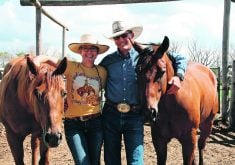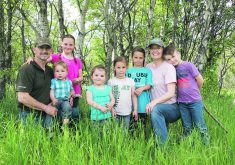On the Farm: Sask. grain producer switches gears as he moves from canola politics to the wheat side of the industry
Nokomis, Sask. – Saskatchewan farmer Brett Halstead entered 2020 with a new position and a new focus.
After representing the interests of prairie canola growers for nearly a decade, Halstead recently assumed duties as chair of the Saskatchewan Wheat Development Commission (SaskWheat).
Over the years, Halstead has spent plenty of time representing grower interests at board tables and on producer commissions.
The Nokomis farmer served for eight years (2009-17) as a board member with the Saskatchewan Canola Development Commission (SaskCanola).
He also sat on the Canadian Canola Growers Association’s board from 2010-17, and was a director with the Canola Council of Canada from 2014-17.
Read Also

Nutritious pork packed with vitamins, essential minerals
Recipes for pork
Halstead said he briefly considered getting out of farm politics and spending more time on the family farm, but decided to throw his hat back in the ring and run for a director’s seat at SaskWheat.
The time commitments and personal sacrifices involved can be significant, he said.
But the opportunity to contribute to the well-being of the Saskatchewan wheat industry was something he couldn’t resist.
When you’re involved in farm politics, “you definitely miss some opportunities on the farm, here and there,” Halstead said.
“But I’ve also found lots of value in what I’ve learned and from meeting the people that I might not have otherwise met.
“I don’t necessarily feel an urge or a need to be involved but I like to be involved. I like to meet people and I like to help make some of those decisions and try to steer the industry in the right direction.”
Halstead’s name is well known in prairie agriculture and in the Nokomis area.
His great grandfather homesteaded near Nokomis around 1908 and his grandfather also farmed in the area starting in the early 1940s.
Brett’s father, Bob, eventually took over the family farm, followed by Brett and his wife Myrna, and more recently, Brett’s son, Shane, and his wife, Paula.
Together, Brett, Myrna, Shane and Paula annually grow cereals, oilseeds and pulse crops on about 4,100 acres.
They also have a herd of about 120 beef cattle.
Keeping a beef herd adds to the workload, said Brett. But it also allows the family to get better use out of marginal lands not well-suited to annual crop production.
All told, about 1,600 acres are used for pasture and hay production.
“We do have some marginal land in this area — some sandy soils — so a rotation of grass is good for it,” Halstead said.
“It just doesn’t make effective grain land, so the cattle work well…. They’re a good fit.”
Halstead concedes there was a time when his career might have taken a turn in a different direction.
Beginning in the early 1980s, he worked for several years with grain buyer United Grain Growers, holding positions at Saskatchewan elevators in Nokomis, Weyburn, Davidson, Herschel and Lucky Lake.
He thought briefly about pursuing a long-term career as a grain buyer but in the end, the appeal of working on the family farm and calling his own shots won out.
“It had crossed my mind,” Halstead said.
“I liked the work (in the elevator business) and I enjoyed the people that I dealt with, but the farm was always close at heart.”
In the mid-1980s, while still working with UGG, Halstead rented a couple of quarter sections from his dad and commuted back to the farm to work the land and manage his crops on weekends and holidays.
By 1988, he quit his off-farm job and made the decision to become a full-time grain farmer.
“I moved home in 1988 and got to experience tough times right away with a good old-fashioned drought,” he said.
“It was a rough start but it also built some ability to make tough decisions and watch our costs, which is something we still try to do today.”
Halstead said it’s rare for his area to get too much moisture, although there were a couple of years in the early 2010s when excess rainfall made crop production a challenge.
More frequently, lack of moisture is the farm’s biggest challenge, particularly on fields that have lighter soils and tend to dry out quickly.
“In drier years, the sandy soil gets stressed first so moisture conservation is always an important consideration,” he said.
“In the mid-1990s, we were one of the first farms in our area to start direct seeding. That’s made a big difference in our ability to grow crops on some of the marginal land.”
In 2019, Brett and Myrna, who is also actively involved in the farming operation, moved into a new house just down the road from the main farm site.
Shane, an agricultural mechanic, and his wife, Paula, now reside on the main farm site.
Brett and Myrna’s other adult children both reside in Regina. Daughter Amanda works with Farm Credit Canada and daughter Kelsey works as a pharmacist.


















